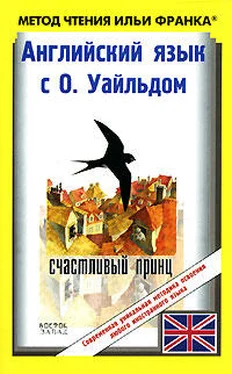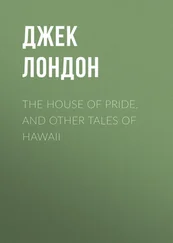But before he had opened his wings (но до того, как он расправил /свои/ крылья; to open — открывать, раскрывать) , a third drop fell (упала третья капля) , and he looked up (и он взглянул наверх) , and saw — Ah! what did he see (и увидел — ах, что же он увидел) ?
The eyes of the Happy Prince (глаза Счастливого Принца) were filled with tears (были наполнены слезами) , and tears were running down his golden cheeks (и слезы катились: «бежали вниз» по его золотистым щекам) . His face was so beautiful in the moonlight (его лицо было настолько прекрасным при лунном свете) that the little Swallow was filled with pity (что маленький Ласточка преисполнился жалостью; to fill — наполнять, переполнять) .
`Who are you (кто ты) ?' he said.
`I am the Happy Prince.'
chimney ['t∫imni ] tear [tiə ] pity ['piti ]
`What is the use of a statue if it cannot keep the rain off?' he said; `I must look for a good chimney-pot,' and he determined to fly away.
But before he had opened his wings, a third drop fell, and he looked up, and saw — Ah! what did he see?
The eyes of the Happy Prince were filled with tears, and tears were running down his golden cheeks. His face was so beautiful in the moonlight that the little Swallow was filled with pity.
`Who are you?' he said.
`I am the Happy Prince.'
`Why are you weeping then (почему же ты тогда плачешь) ?' asked the Swallow (спросил Ласточка) ; `you have quite drenched me (ты совсем промочил меня насквозь /своими слезами/; to drench — пропитывать влагой, смачивать) .'
`When I was alive (когда я был жив) and had a human heart (и /у меня/ было человеческое сердце) ,' answered the statue (ответила статуя) , `I did not know what tears were (я не знал, что такое слезы) , for I lived in the palace of Sans-Souci (потому что я жил во дворце Сан-Суси; sans-souci — фр. беспечный, беззаботный; тж. Sanssouci — летний дворец Фридриха Великого, Короля Прусского в Потсдаме под Берлином, по красоте соперничающий с Версалем) , where sorrow is not allowed to enter (куда печали/горю не позволено = запрещено входить) . In the daytime I played with my companions in the garden (днем я играл со своими товарищами в саду) , and in the evening I led the dance in the Great Hall (а вечером я был первым на танцах в Большом Зале; to lead the dance — вести, возглавлять танец; играть главную роль, to lead (led) — вести, руководить, dance — танец) . Round the garden ran a very lofty wall (вокруг сада тянулась очень высокая стена = сад был обнесен очень высокой стеной; to run (ran, run) — бежать, lofty — очень высокий) , but I never cared to ask (но я никогда так и не удосужился спросить; to care — заботиться, беспокоиться, иметь желание) what lay beyond it (что находится/расположено за ней; to lie (lay, lain) — лежать) , everything about me was so beautiful (все вокруг меня было настолько прекрасным) .
drench [drent∫ ] sorrow ['sorəυ ] beyond [bi'jond ]
`Why are you weeping then?' asked the Swallow; `you have quite drenched me.'
`When I was alive and had a human heart,' answered the statue, `I did not know what tears were, for I lived in the palace of Sans-Souci, where sorrow is not allowed to enter. In the daytime I played with my companions in the garden, and in the evening I led the dance in the Great Hall. Round the garden ran a very lofty wall, but I never cared to ask what lay beyond it, everything about me was so beautiful.
My courtiers called me the Happy Prince (мои придворные называли меня Счастливым Принцем; to call — звать, называть) , and happy indeed I was (и я действительно был счастлив) , if pleasure be happiness (если удовольствие и есть счастье) . So I lived (так я жил) , and so I died (и так я умер) . And now that I am dead (и теперь, когда я мертвый) they have set me up here (они вознесли меня сюда: «они поставили меня здесь высоко») so high that I can see (так высоко, что я могу видеть) all the ugliness and all the misery of my city (всю мерзость и все страдания моего города; ugly — безобразный, уродливый, ugliness — уродство, омерзительность) , and though my heart is made of lead (и, хотя мое сердце и сделано из свинца) yet I cannot choose but weep (я не могу не плакать; to choose — выбирать, иметь свободу выбора) .'
`What, is he not solid gold (вот как, разве он не из чистого/цельного золота; solid — твердый; чистый, однородный) ?' said the Swallow to himself (подумал Ласточка про себя) . He was too polite (он был слишком вежливым) to make any personal remarks out loud (чтобы произносить такие замечания вслух; personal — личный, задевающий личность, loud — громко) .
pleasure ['pleζə ] misery ['miz(ə)ri ] lead [led ]
My courtiers called me the Happy Prince, and happy indeed I was, if pleasure be happiness. So I lived, and so I died. And now that I am dead they have set me up here so high that I can see all the ugliness and all the misery of my city, and though my heart is made of lead yet I cannot choose but weep.'
Читать дальше












